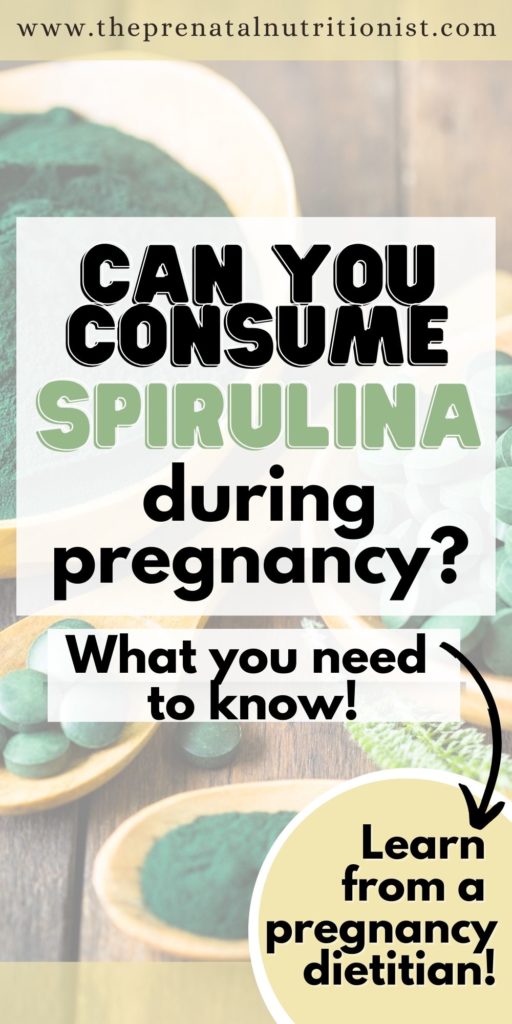
Spirulina during pregnancy: are there benefits?
Spirulina is a supplement that has been around for a long time. You may recall its popularity from the mid-2000s when it seemed everyone was taking it.
There are many purported health benefits. But is spirulina during pregnancy safe? Could it even provide benefits for pregnant women? Let’s take a look.
What is spirulina?
Spirulina comes from blue-green algae, or cyanobacteria, that grows in fresh and saltwater (1).
It’s an extremely popular supplement that’s recognized worldwide as the “ultimate superfood.” Spirulina is reported to increase energy, improve your mood, have potent antioxidants, and potentially help prevent heart disease, non-alcoholic fatty liver disease, and cancer (2, 3, 4).
Spirulina consumption dates back to the Aztecs in the 1400s and 1500s. But is said to be more than 3.5 billion years old. The Aztecs would harvest spirulina, dry it, then mix it with other foods they ate (5).
The legend is that emperor Montezuma liked to eat fish and would send his followers hundreds of kilometers away from home to the ocean to catch the fish the emperor liked. And, spirulina was the food that kept them energized for the long haul.
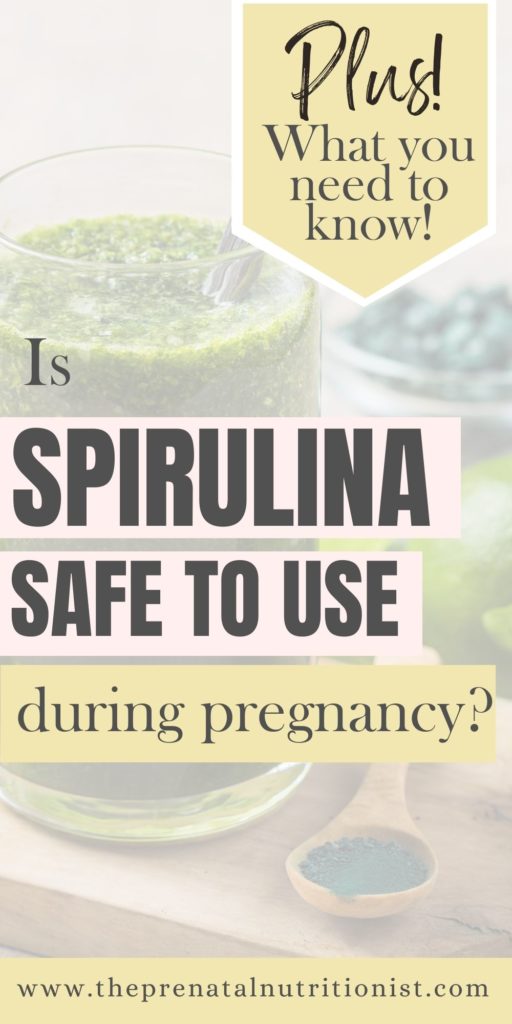
Is spirulina safe during pregnancy?
There is not a lot of research done with eating spirulina and investigating the effects it has on pregnant women. But there are a few articles that touch on the benefits and the risks that we will discuss throughout this article.
Studies in mice are promising, as they tend to show positive effects of spirulina during pregnancy.
In 2012, a study was published that demonstrated protective effects that spirulina’s antioxidants had on a certain type of neural tube defect that can occur in pregnant humans and mice (6).
Another study done in sub-Saharan African women who were pregnant saw an improvement in anemia status when they consumed spirulina in the third trimester of their pregnancies (7).
They actually found that taking spirulina was more effective than taking an iron and folic acid supplement. It was also noted that no adverse side effects were seen when the women took 1500 mg/day of spirulina in tablet form.
In a separate study with rats in 1998, the investigators found a higher iron storage level than that of the control group (8).
The evidence that is available is promising. But most of the studies have been done in mice, with few being completed in humans, especially pregnant women.
Of the studies that were promising, it seems that spirulina was mostly given or taken during the third trimester of pregnancy, which produces the least severe potential birth defects.
What nutrients are in spirulina?
6 tablets, each 500 mg of spirulina
Energy: 10 kcal
Protein: 2 g
Calcium: 20 mg
Iron: 1.8 mg
Sodium: 40 mg
Vitamin B12: 3.6 ug
Vitamin A: 7000 IU
All data provided by the USDA nutrient database.
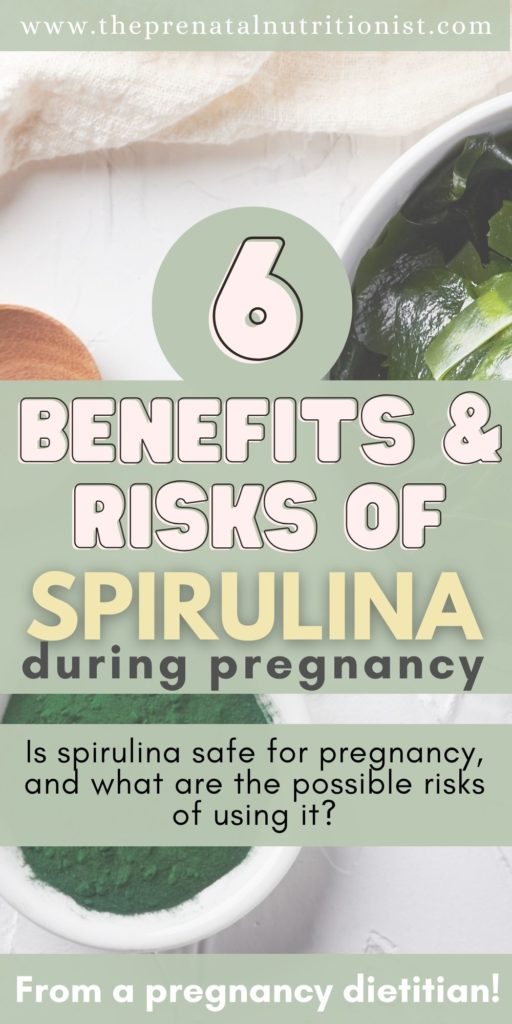
Benefits of spirulina during pregnancy
Antioxidants & anti-inflammatory properties
The main component of spirulina is phycocyanin, which also gives spirulina its blue-green color. Phycocyanin is an antioxidant that helps fight free-radicals and inhibits inflammation. Decreasing free radicals in the body can help lower cholesterol levels!
Other researchers suggest spirulina can protect against oxidative stress and boost our immune system to help prevent many chronic health conditions (9, 4).
Iron
Phycocyanin also contributes to red blood cell production, which makes it popular among research studies to investigate the effects of spirulina (and phycocyanins) on the capabilities of algae during pregnancy and iron level changes.
Your body uses iron to make hemoglobin, which carries oxygenated cells throughout your body. When you are pregnant, you need more iron to accommodate your growing baby, and your growing body (10).
If you do not consume enough iron, then you could be at risk for developing iron-deficiency anemia.
When you have iron-deficiency anemia, you may notice you are fatigued and feel weaker than usual. You may also experience cold hands and feet and pale skin. Severe anemia has the potential to cause premature birth, low birth weight, and postpartum depression (10).
Iron can be found in meat, like chicken and beef. And can also be found in plants, such as cooked spinach and collard greens.
Protein
Two tablespoons of spirulina powder have 6 grams of protein, according to the USDA nutrient database (11).
Protein is vital to consume while you are pregnant. Protein helps your baby grow, especially his or her brain. It also plays a role in expanding your blood supply and growing your breast and uterine tissue.
Protein can be found in plant and animal-based foods. Such as fish, chicken and other meats, nuts, peas, and beans. However, many plant sources of protein are not complete proteins, meaning they do not contain all the essential amino acids. Spirulina is not a complete protein, but it does contain the amino acid phenylalanine, which needs to be avoided if you have phenylketonuria.
As a plant-based protein, spirulina can contribute to protein and iron needs for those following a vegetarian diet during pregnancy.
Omega-3 Fatty Acids
Algae is one of the only plant sources of direct DHA (a type of omega-3 important for brain development in baby). We mainly get DHA from seafood like salmon, sardines, and trout.
In addition to being a vital part of the development of your baby, omega-3s are important for heart health and especially beneficial if you’ve previously been told you have high blood pressure.
Spirulina will provide some omega-3 fatty acids, but not enough on its own to meet your needs during pregnancy. The algae chlorella has more omega-3s than spirulina, if this is what your main focus is.
Spirulina Pregnancy Side Effects
Oligohydramnios
In Malaysia, researchers found an association between women who took spirulina during pregnancy and a lower than normal amniotic fluid volume for gestational age, called oligohydramnios (12).
Amniotic fluid is vital for your baby’s development and can cause birth defects, low birth weight, and miscarriage (13).
Toxin exposure
While spirulina is not likely to harm you, it should be noted that sometimes microcystins can infiltrate this superfood as well as some heavy metals (2, 14).
However, it will make you feel better knowing a study completed in 2013 tested 25 different spirulina products and found that all 25 were within safe limits of toxic load. The most plentiful metals were Zinc and Nickel. Which are substantially less toxic than other metals like lead and arsenic (14).
Microcystins, on the other hand, cannot be broken down once ingested and can cause serious liver damage (15). A separate study in Montreal in 2016 tested cyanotoxin content of 18 brands and found that 8 contained some level of cyanotoxins, 4 were contaminated with microcystins, specifically (2).
In agreement with the researchers, product quality assurance is important. Find a high-quality product that is third-party tested for purity and potentially organic. Read the ‘best by’ labels and storage instructions as to avoid any harmful bacteria from growing in any supplement you use.
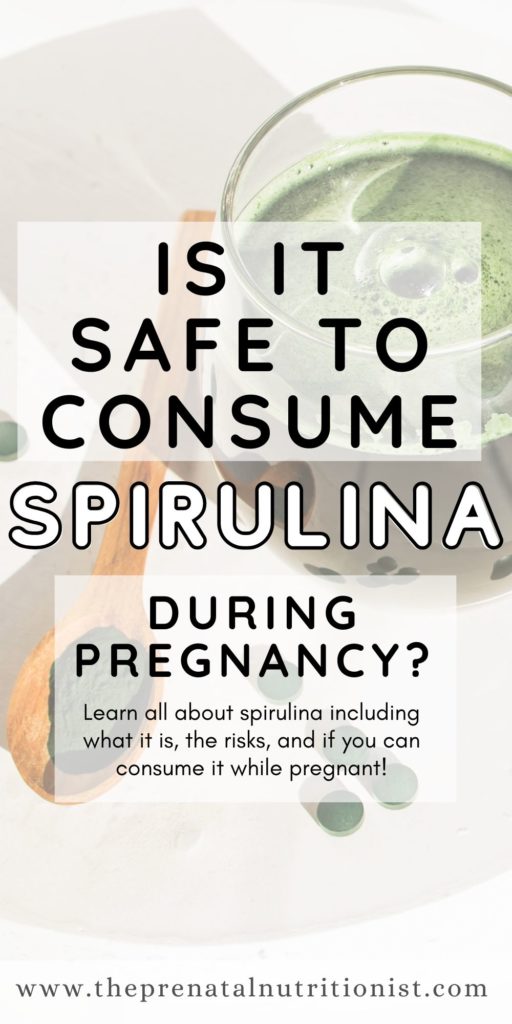
How to include spirulina in your diet
With the potential benefits of spirulina being increased iron levels and an extra punch of protein, you may be interested in taking it as a supplement, which is available as a tablet or powder.
The most popular way to add it to your diet is perhaps in your favorite smoothie. But you can also mix a spoonful into your water and drink it as is. Don’t exceed more than the recommended package dose of spirulina per day.
The bottom line
Since the evidence is scant regarding the potential benefits and detriments of consuming spirulina while pregnant, it is best to speak with your doctor or dietitian regarding the safety of its consumption with your unique situation.
With its promising effects on iron levels, spirulina may be a beneficial choice if you are experiencing anemia. It may also be a good addition to your diet if you are vegetarian.
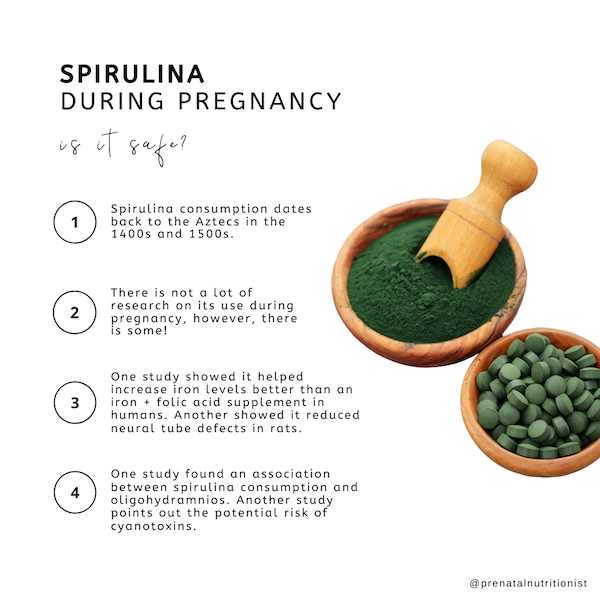
Again, be sure to discuss adding spirulina to your diet during pregnancy with your doctor or dietitian to be sure it is safe for you and your growing baby, especially if you are planning to forgo the iron capsule.
As researchers P B Persson and A Zakrisson say it, spirulina may be an easy, cheap protein source, but people are stretching the truth by labeling it a “superfood” (16).
Buy spirulina from a reputable brand, or store, that participates in third-party testing. This is the best way to ensure you are receiving a high-quality product that is free of any harmful toxins.
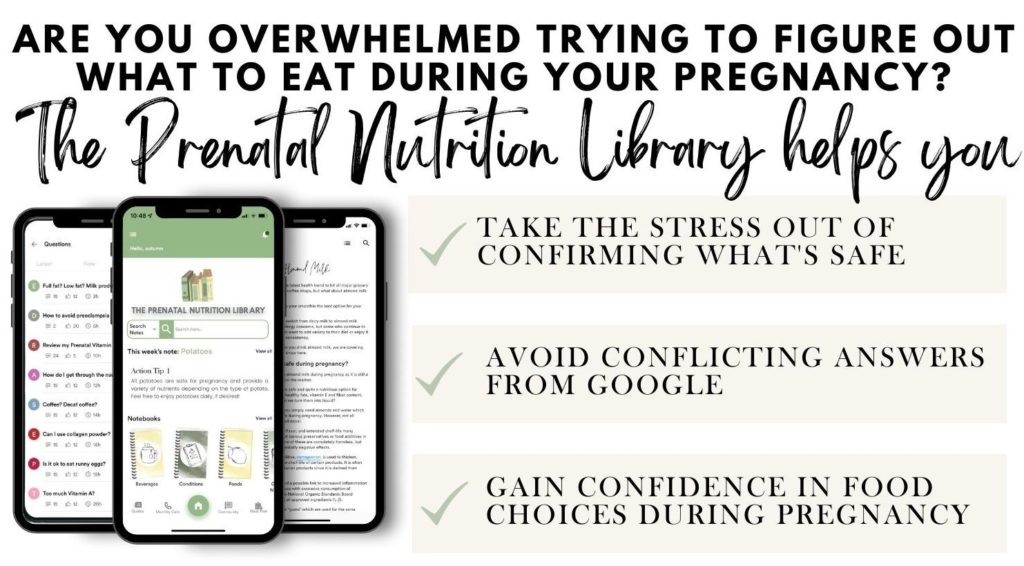

By Alexa D’ Orazio, Dietetic Intern and Ryann Kipping, MPH, RDN, LDN | Owner & Founder










